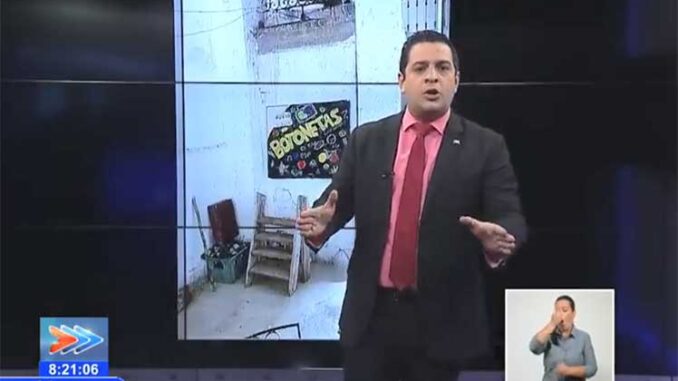
State-run television on Friday linked Cuban performance artist and dissident Luis Manuel Otero Alcántara to a U.S. government-funded democracy program.
TV journalist Humberto López accused Otero of working for the National Democratic Institute for International Affairs, based in Washington, D.C. López displayed an agreement purportedly showing that NDI had agreed to pay Otero up to $1,000 per month from Feb. 1, 2021 to April 1, 2022.
I have not verified the authenticity of the document. Such documents are generally kept secret to protect the identity of program participants. Cuban authorities have been known to obtain such documents from informants, undercover agents, interception of electronic messages, or seizure of laptops and other devices.
Otero had been planning an exhibition of paintings featuring candy wrappers. Growing up, he wrote, many Cuban children never have enough money for candy and have to make do with sniffing discarded wrappers to enjoy the scent of chocolate or gum.

Otero blamed the socialist government for creating shortages that make it impossible for most children to eat candy.
“It is the responsibility of the system that the children also have sweets, fantasies and that their dream is not to emigrate,” he wrote on Facebook in March.
On Saturday, he scoffed at the accusations that the U.S. government was funding his activities. Addressing Cuban President Miguel Díaz-Canel directly, Otero asked, “Díaz-Canel, how can Cuban children with parents who earn their salary in Cuban pesos eat candy that you sell in dollars? And am I the one paid by the CIA?”
On Saturday, Cuban authorities briefly detained Otero as government supporters carried out acts of repudiation against other dissidents.
Otero is a prominent member of the San Isidro Movement, organized in 2018 to protest government censorship. On March 24, the U.S. Senate Committee on Foreign Relations passed a resolution supporting the movement.
Cuban authorities contend that the Movimiento San Isidro, as it’s known in Spanish, receives U.S. government funds, which some critics say would undermine its legitimacy as a spontaneous grassroots movement.
The National Democratic Institute, or NDI, has 53 offices around the world and employs 733 people outside the U.S.
The NDI received at least $6,615,674 for Cuba programs from 2002 to 2021, records show. See descriptions of projects.
 The organization supported the Varela Project, a petition drive aimed at bringing about political reforms in Cuba. Records show NDI spent at least $388,000 to raise awareness and build international support for the Varela Project from 2002 to 2004.
The organization supported the Varela Project, a petition drive aimed at bringing about political reforms in Cuba. Records show NDI spent at least $388,000 to raise awareness and build international support for the Varela Project from 2002 to 2004.
NDI’s website states:
NDI has worked in solidarity with Cuban democracy activists since 1991, sharing information about democratic institutions and practices and helping to increase international awareness of the efforts of courageous Cubans on the island advocating for peaceful democratic change. Drawing on examples from Latin America and elsewhere, NDI programming focuses on long-term capacity building of independent Cuban civil society actors, exposing them to core skills and democratic practices for supporting an open and inclusive political system.
The NDI would not exist if not for U.S. government support, which amounted to $124,823,245 from Oct. 1, 2018 to Sept. 30, 2019.
U.S. taxpayers financed 99.869% of the NDI’s activities in fiscal 2018, tax records show.
The NDI has 393 employees and 164 volunteers in the U.S. and paid out $57,282,905 in salaries in 2018. Records show 13 executives received more than $200,000. The highest paid was President Kenneth Wollack, who received $407,585.
NDI shelled out $82,696,907 to 733 employees and independent contractors outside the U.S. The nonprofit also gave $22,817,029 in grants to foreign organizations and individuals.
Other expenses in 2018 included $15,370,679 for travel, $4,045,596 for conferences and meetings, $4,153,867 for office expenses and $4,510,038 for rent.
Tax records do not break down NDI’s Cuba expenses, but say the group has four offices and employs 40 people in Central America and the Caribbean.


Leave a Reply